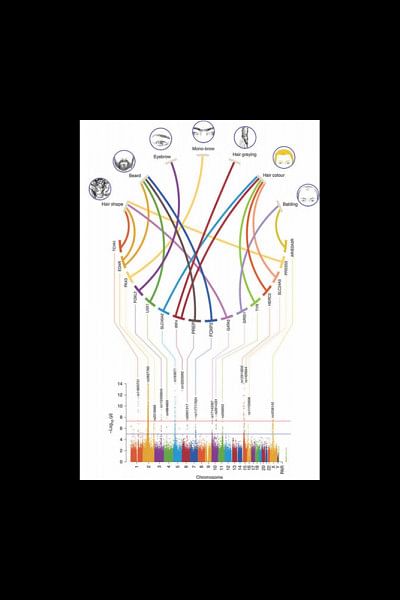The Gene called IRF4

Photos: courtesy
Kaustubh Adhikari's name might not be familiar to many of us. But if you Google his name, you will find this 30- year-old Indian scientist is taking the world of human genetics by storm with his recent discovery about grey hair. The possibility of this discovery in the near future bringing an end to our hair greying problem can surely bring a smile on your face. You might find yourself with a bigger smile when you know that the ancestral home of this genius is in Barisal while his in-laws are from Chittagong.
“I have a special bond with Bangladesh. I try to visit Bangladesh every year,” says the modest, ever smiling Adhikari.
An international study, with Adhikari as the lead author, led by University College London (UCL) reports the discovery of the first gene identified for greying hair, confirming that greying has a genetic component and is not just an environmental occurrence.
“We have discovered a gene called IRF4, which is associated with our study of hair greying,” says Adhikari, statistical geneticist and lead author of UCL Cell & Developmental Biology. “We previously saw this gene associated with hair colour as well, which is caused by a natural pigment called melanin present in our skin, hair and eyes.This gene is involved in regulating production and storage of melanin.”
Published last week in Nature Communications, a popular science journal, the study started by collecting and analysing DNA samples from 6,630 volunteers from the CANDELA cohort recruited in Brazil, Colombia, Chile, Mexico and Peru, where 45 percent of the volunteers were male while 55 percent were female. Having a collection of people from different backgrounds - mixed Europeans (48 percent), Native American (46 percent) and African (6 percent) ancestry - ensures a large variation in head hair appearance.
“While both men and women were assessed for hair shape, colour, balding and greying, but only men were tested for beards, mono brows and eyebrow thickness,” he adds. “Visual traits for each individual were compared to whole genome analysis results to identify the genes driving differences in appearance.”
“We already know several genes involved in balding and hair colour but this is the first time a gene for greying has been identified in humans, as well as other genes influencing hair shape and density,” says Adhikari.

So how is this discovery going to help the world?
First, Adhikari and his team have given us the name - IRF4 - so now we know who to blame when we find a grey hair.
Also, this finding is going to help develop forensic and cosmetic applications by increasing our knowledge on how genes affect individual appearance.
Adhikari believes that analysing an assorted group of people, which hasn't been done previously on this scale, has made it possible to create this first of its kind study. Previously in other research, sampling was done only people of European origin while these new results could help forensic reconstructions also in Latin America and East Asia.
Hair greying is caused by an absence of melanin in hair, thus the scientists want to find out IRF4's role in this process. Understanding how IRF4 influences the greying of hair could help the development of new cosmetic applications and better treatments that will help the slowing down or blocking of the greying of hair from the very beginning.
Besides greying of hair, another gene, PRSS53, was also discovered to influence the curliness of hair, as investigated by the University of Bradford's Centre for Skin Sciences as part of the study. The scientists also discovered additional genes associated with hair - EDAR for beard thickness and hair shape; FOXL2 for eyebrow thickness and PAX3 for mono-brow prevalence.
“We have just discovered one greying gene, which is not the main reason behind grey hair. Natural or sexual selection and external factors like diet and stress can also influence hair characteristics, and we found statistical evidence in the genome supporting that view,” added Adhikari. “The genes we have identified are unlikely to work in isolation to cause greying or straight hair, or thick eyebrows, but have a role to play along with many other factors yet to be identified. We need to conduct further research to develop a better understanding, so that we can discover the specific components and come up with suitable drugs that can delay or stop greying of hair.”

 For all latest news, follow The Daily Star's Google News channel.
For all latest news, follow The Daily Star's Google News channel. 



Comments